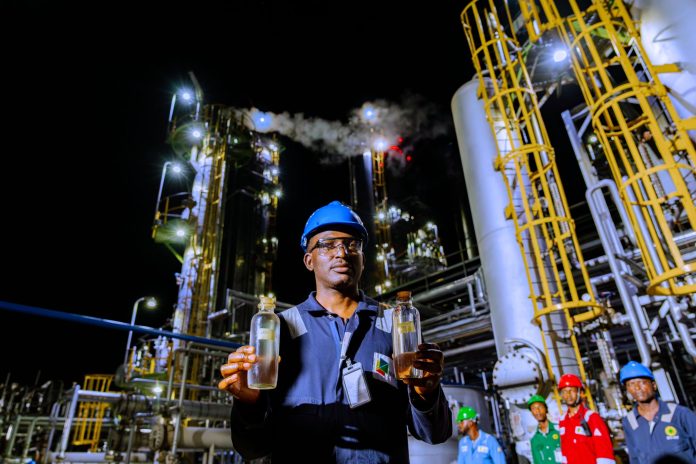In a landmark achievement, the Nigerian National Petroleum Company (NNPC) Ltd. has successfully restored operations at the Port Harcourt Refining Company (PHRC). This marks a significant step in Nigeria’s quest for energy self-sufficiency as the refinery commences crude oil processing and the delivery of petroleum products to the market.
The historic event unfolded on Tuesday as trucks began loading petroleum products from the facility. The initial products dispatched include Premium Motor Spirit (PMS), commonly known as petrol, Automotive Gas Oil (AGO) or diesel, and Household Kerosene (HHK). Additional product categories are expected to follow, bolstering the nation’s fuel supply chain and reducing reliance on imports.
A New Era of Energy Independence
Speaking during the ceremony to commemorate the refinery’s re-streaming in Port Harcourt, NNPC’s Group Chief Executive Officer (GCEO), Mr. Mele Kyari, described the development as a monumental achievement for the nation. He underscored its significance in heralding a new era of energy independence, economic growth, and self-reliance for Nigeria.
Mr. Kyari extended his heartfelt gratitude to President Bola Ahmed Tinubu, GCFR, whose unwavering support and vision were pivotal in realizing the refinery’s rehabilitation. He credited the President’s persistence and focus on energy security as instrumental in achieving this milestone, which aligns with the administration’s commitment to revitalizing Nigeria’s oil and gas sector.
The GCEO also commended the NNPC Ltd. Board of Directors, management, staff, and contractors for their collective dedication, resilience, and hard work despite the complexities and challenges faced during the refinery’s restoration. He assured Nigerians of the Company’s determination to deliver on the rehabilitation of other refineries in the country.
“Today is a proud moment for us as an organization and for Nigeria as a whole. The recommissioning of the Port Harcourt Refinery is a testament to our commitment to restoring the nation’s refining capacity and meeting legitimate public expectations,” Kyari said.
Regulatory and Safety Commitment
Adding his voice to the celebration, the Chief Executive of the Nigerian Midstream & Downstream Petroleum Regulatory Authority (NMDPRA), Mr. Farouk Ahmed, lauded the achievement as a significant milestone. He pledged the agency’s continuous regulatory support to ensure the successful rehabilitation of Nigeria’s other refineries.
The Port Harcourt Refinery’s rehabilitation project stands as a model of operational excellence, having recorded over 16 million man-hours with zero Loss Time Injury (LTI). This Engineering, Procurement, Construction, Installation, and Commissioning (EPCIC) initiative reflects a rigorous commitment to safety, efficiency, and global standards.
Economic and Strategic Impact
The resumption of operations at the PHRC holds far-reaching implications for Nigeria. It promises to address perennial challenges in fuel supply, reduce dependence on costly fuel imports, and strengthen local refining capacity. This development also supports job creation and economic stimulation in the Niger Delta region, a crucial hub for Nigeria’s oil and gas industry.
As the refinery begins the truck-out of petroleum products, industry stakeholders and citizens alike look forward to a ripple effect across the downstream sector, characterized by enhanced availability of fuel and improved price stability.
Looking Ahead
The Port Harcourt Refinery’s re-streaming is not just a technical achievement but a strategic move towards achieving self-sufficiency in petroleum refining. With the successful rehabilitation of this facility, attention will now shift to the timely delivery of ongoing projects at the Warri and Kaduna refineries.
NNPC Ltd. has reiterated its commitment to ensuring these initiatives are delivered promptly, ushering in a future where Nigeria can fully harness its refining capacity to meet domestic and export demands.
This achievement signals a renewed commitment to energy solutions that empower the nation, foster economic growth, and solidify NNPC’s position as a catalyst for development in the Nigerian oil and gas sector.




